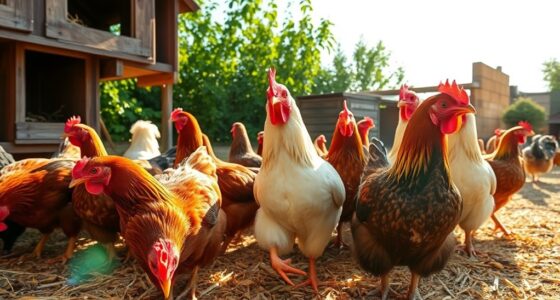To keep your chickens safe from predators, build a sturdy coop using welded wire or hardware cloth, making sure there are no gaps or loose areas. Elevate the coop slightly off the ground and lock all doors securely each night with predator-proof latches. Install motion-activated lights, security cameras, and reinforce fencing, especially around outdoor runs. Regular inspections and perimeter management help spot vulnerabilities early. Keep predators at bay by following these tips—more strategies await if you continue ahead.
Key Takeaways
- Use sturdy, predator-proof materials like welded wire and secure locks to prevent entry.
- Install motion-activated lights and security cameras to deter and monitor intruders.
- Regularly inspect and repair the coop for gaps, holes, or damage, especially after storms.
- Clear surrounding brush and debris to eliminate hiding spots for predators.
- Bury fencing underground and reinforce outdoor runs to prevent digging and climbing attacks.

Keeping your chickens safe from predators is essential to maintaining a healthy flock. Predators are always on the lookout, especially during the night when chickens are most vulnerable. Night time predators like raccoons, foxes, and owls can silently infiltrate your coop if you haven’t prioritized coop security. To protect your flock, you need to understand how these predators operate and take proactive steps to keep them out.
Start with securing the coop itself. Use sturdy materials like welded wire or hardware cloth instead of chicken wire, which predators can easily chew through or break. Make sure the wire mesh is tightly attached to the frame, with no gaps or loose areas where a predator could squeeze through. Elevate the coop slightly off the ground to prevent raccoons from digging underneath. Cover any vents or air holes with hardware cloth, as these are common entry points for nighttime predators. Lock all doors and access points securely every night, and consider installing latches that are predator-proof—those that require a key or are too complex for animals to manipulate. Additionally, applying predator deterrents around the coop can further discourage unwanted visitors. Using motion-activated lights can also be highly effective at startling and deterring nocturnal predators.
Secure your coop with sturdy hardware cloth, elevate it, and lock all access points nightly.
Lighting can also be a helpful deterrent. Bright motion-activated lights outside the coop can scare away animals that are trying to approach silently. Inside, a light with a timer can prevent predators from creeping in unseen. Regularly inspect the entire structure for weak spots or damage, especially after storms or rough weather, since even a small hole can become a gateway for predators. Regular maintenance and prompt repairs are essential to uphold overall security. Furthermore, implementing security cameras can help monitor activity and identify potential threats early. Additionally, incorporating proper lighting can reduce the chances of predators approaching unnoticed, as darkness provides cover for sneaky intruders.
Another important aspect of coop security is managing the area around your coop. Clear away brush, tall grass, or any debris that predators could hide behind while stalking your chickens. Keep the area well-maintained and free of clutter, making it easier to spot any signs of intrusion or attempted break-ins. If you have a run or outdoor space for your chickens during the day, reinforce the fencing and bury the bottom edges underground to prevent digging predators from gaining access. Additionally, understanding affiliate disclosures can help you choose the best security products by being aware of trusted sources and reviews.
Frequently Asked Questions
How Do I Identify Signs of Predator Attacks?
To identify signs of predator attacks, look for unusual noises near your coop, which might indicate a prowling predator. Track footprints around the area, especially near entry points or disturbed bedding. Check for torn or missing fencing and scattered feathers, which can signal a breach. Keep an eye out for signs of digging or paw prints, and monitor your chickens closely for any injuries or signs of distress.
What Are the Best Deterrents for Raccoons?
Think of raccoons as sneaky burglars, always testing weak spots. To deter them, use effective scare tactics like motion-activated lights and loud noises—raccoon behavior shows they’re cautious of sudden changes. Secure the coop with tight-fitting lids, remove food sources, and install electric fencing. These measures make your coop less inviting, forcing raccoons to look elsewhere. Stay vigilant, and your chickens will stay safe from these clever predators.
How Often Should I Inspect the Coop for Vulnerabilities?
You should inspect your coop weekly to catch vulnerabilities early. Check the coop ventilation to guarantee it’s secure and free of gaps that predators could exploit. Examine predator-proof fencing closely, especially around the base and any weak spots. Regular inspections help you spot and fix issues like loose hinges or damaged wiring, keeping your chickens safe from predators. Staying vigilant is key to maintaining a secure coop environment.
Can Certain Plants Help Deter Predators Naturally?
Imagine planting marigolds around your coop; they’re known as predator resistant plants and natural repellents. These plants emit scents that deter raccoons and other predators, making your coop less attractive. Using predator resistant plants like marigolds or garlic can help create a natural barrier. Incorporate these plants into your yard to enhance protection, reducing the need for chemical repellents and making your chickens safer naturally.
What Safety Measures Are Effective During Winter Months?
During winter, you should focus on winter fencing that’s sturdy and high enough to deter predators. Use snow cover strategies like clearing pathways and piling snow around the coop to make it less appealing for predators to dig or hide nearby. Keep your chickens indoors during the coldest parts of the day, and guarantee the coop is well-insulated and secure. These steps help safeguard your flock when predators are most active.
Conclusion
By taking these simple steps, you can keep your chickens safe and secure from predators. Regularly inspect and reinforce your coop, stay vigilant, and understand the threats in your area. Remember, a well-protected coop isn’t just about peace of mind—it’s about safeguarding your flock’s health and happiness. Isn’t it worth the effort to guarantee your chickens feel safe and secure every day? Protecting your chickens isn’t just a duty; it’s a way to show you care.









